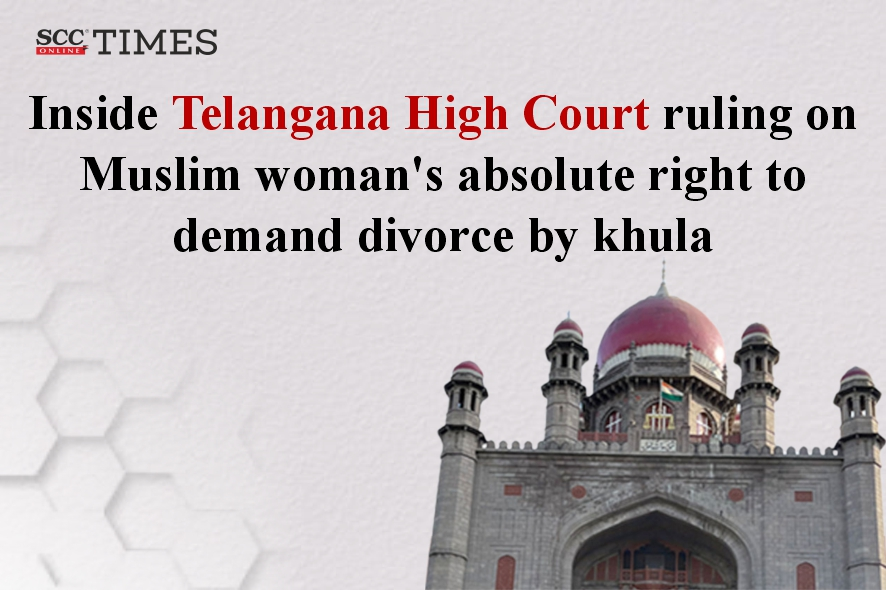Telangana High Court: In a petition filed by the husband seeking to declare the impugned order passed by Respondent 2, wherein the marriage between him and his wife was dissolved, as null and void, the Division Bench of Moushumi Bhattacharya, J.* and B.R. Madhusudhan Rao, stated that the wife’s right to demand khula was absolute and does not have to be predicated on a cause or acceptance of the demand by the husband. Therefore, the Court found the petition to be misconceived and contrary to established legal principles, and accordingly, dismissed of the same.
Background
The husband and wife, in the present case, were married in 2012 with a dower (mahr) of Rs 11,000. After five years of marriage, wife alleged instances of domestic violence, including a serious assault in 2017, that led to her hospitalization and subsequent relocation to her parental home. Following repeated disputes and failed reconciliation, the wife sought Khula. Upon the husband’s refusal to grant Khula, the wife approached Respondent 2, a body comprising Islamic law experts including a Mufti, professors of Islamic Studies and Arabic, and an Imam of a Mosque, for intervention.
The wife issued notices to the husband and invited him for reconciliation meetings, which he declined, questioning their authority. After failed conciliation efforts, Respondent 2 issued a Khulanama (certificate of divorce) on 5-10-2020, declaring the dissolution of the marriage.
Challenging the same, the husband filed a petition before the Family Court, Hyderabad, seeking a declaration that the Khulanama was null and void, and a permanent injunction restraining the wife from claiming she was no longer his wife. Subsequently, the Family Court dismissed the petition, holding the Khula valid under Muslim personal law and emphasizing the husband’s non-cooperation in the reconciliation process.
Analysis, Law, and Decision
The Court reaffirmed that, a Khulanama issued by a Mufti or religious body such as a Dar-ul-Qaza does not put a seal of finality on the dissolution of the marriage, as such opinions are purely advisory in nature. What holds legal significance is the transition of the dispute into the judicial realm, i.e., when either party seeks formal adjudication by a court.
Reiterating established principles, the Court held that a Muslim wife’s right to seek Khula is absolute and does not need to be predicated on her husband’s consent or any cause. The Court stated that once a demand for Khula is made and reconciliation efforts fail, the role of the Court is limited to putting a judicial stamp on the termination of the marriage, which then becomes binding on both parties.
The Court further stated that the Family Court is simply to ascertain whether the demand of Khula is valid upon an effective attempt to reconcile the differences between the parties whether any offer to return the dower (mahr) was made by the wife. This inquiry must be conducted in a summary manner without requiring detailed evidentiary proceedings.
Accordingly, the Court found the husband’s prayer seeking a declaration that the Khulanama issued by Respondent 2 as null and void to be misconceived and legally unsustainable. While the Court upheld the Family Court’s decision dismissing the husband’s petition, it took exception to certain findings of the Family Court that implied a Mufti had the authority to issue a legally binding Khula divorce. The Court clarified that no religious body holds such adjudicatory power under Indian law.
The Court further emphasized that Muslim women’s post Khula legal status should not be subjected to unnecessary delays and reiterated the obligation of courts to ensure timely and fair resolution. The Court concluded that the said impugned order of Family Court was correct and dismissed the present petition.
[Mohammed Arif Ali v. Smt. Afsarunnisa, 2025 SCC OnLine TS 368, decided on 24-6-2025]
*Judgment authored by- Justice Moushumi Bhattacharya
Advocates who appeared in this case:
For the Appellant: J. Prabhakar, Senior Advocate; Mohd. Shafiuddin, Advocate.
For the Respondents: Mubashir Hussain Ansari, Imtiaz Gulam Mahboob Faiz MD, Advocates.


